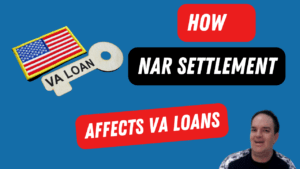
How The NAR Settlement Affects VA Home Buyers
How The NAR Settlement Affects VA Home Buyers https://www.youtube.com/watch?v=pY5EG1q5NW0 The National Association of Realtors settled the commission lawsuit on March 15, 2024. Here are the
Carlos Scarpero- Dayton and Cincinnati Ohio Mortgage Broker

Yesterday, the Blue Water Navy Vietnam Veterans Act of 2019, also known as HR 299, was signed into law by President Trump. I’ve reviewed the original text from Gov Track and here’s what I’ve found out.
This bill is mostly designed to expand medical coverage for Vietnam War Veterans who were exposed to Agent Orange, which is why the bill is named after them. There are also some provisions in the bill that apply to Korean War Veterans that may have been exposed to Agent Orange.
The new law changes how the maximum loan amount is determined on VA Home Loans.
Some bloggers are referring to a “VA loan cap” but the “cap” is a bit of a misnomer. There’s actually not any cap on VA Mortgages. There is a cap on getting a VA Mortgage with zero down and this cap is based on the Fannie Mae lending limits where the buyer is purchasing a home.
Here in Ohio, for 2019, that limit is currently based on the Fannie Mae base limit of $484,350. For home buyers outside of Ohio in high cost areas, this limit is higher.
Under current law, when a borrower goes over the Fannie Mae limit, they have to pay 25% of the difference as a down payment. So, for example, a veteran buying a $850,000 house in Springboro, Ohio would have a down payment of $91,412.50. In this example, $484,350 is subtracted from $850,000 and that difference is divided by 4.
Under the new law, the $850,000 home can be purchased for zero down!
The new law goes into effect January 1, 2020.
Keep in mind that the new rules only apply when the veteran does not have a VA loan right now or will sell the current home prior to closing on the new home. If the veteran is retaining their current residence after closing, then the current rules would apply.
The other big change in the law is with regard to VA funding fees.
The new law goes into effect on January 1, 2020 and the new rates are based on the closed date, not the date the loan was locked.
Currently, for non exempt veterans, there is a small fee bump for reservists. The bump will be removed.
First time usage with zero down will go up from 2.15% to 2.3% for all eligible non exempt veterans. Since reservists are currently at 2.4%, they will actually see a decrease since they will also be at 2.3%.
This higher funding fee rate will be in effect for 2 years and then on January 1, 2022, it’s scheduled to go back down to current levels, but this time the reservists will not have a bump.
Then, on October 1, 2029, the funding fee is scheduled to get changed again, this time to below current levels. As the law now stands, first time usage with zero down will get changed to 1.4%.
As you can see, there were some big changes made yesterday and I hope this post clears up any confusion you may have regarding the new law.
Things are always changing and if I hear of anything new regarding this bill, I’ll be sure to update this post.

How The NAR Settlement Affects VA Home Buyers https://www.youtube.com/watch?v=pY5EG1q5NW0 The National Association of Realtors settled the commission lawsuit on March 15, 2024. Here are the

Can You Buy A Mixed-Use Property With A VA Loan? https://www.youtube.com/watch?v=hS0IY-4R8JY Are you considering using your VA home loan benefit to purchase a mixed-use property?

Who Should Refinance In December, 2023? https://www.youtube.com/watch?v=sZAW0egRgcs Who needs to refi right now? We have experienced a market where rates are finally dropping. Yea!